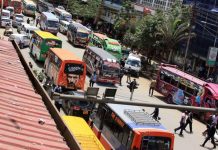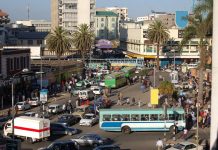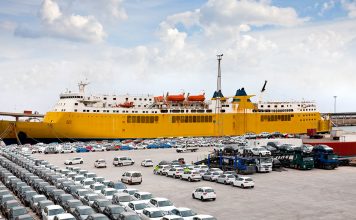Of all members of Kenya Police, the traffic cop is the least likely to shoot the boss or fellow colleagues. They also rarely commit suicide or kill spouses according to a medic dealing with mental cases in Kenya.
The same is not the case with regular police and the baddest of them all, the Administration Police, who are the most likely to shoot their superiors before turning guns on themselves.
Interestingly, the General Service Unit (GSU) who are trained to maim and even kill rarely shoot fellow cops or commit suicide according to the medic at Kenya’s leading psychiatrist facility.
According to the occupational therapist at the Mathari National Teaching and Referral Hospital - and whose identity we shall not disclose since he is not authorised to share information with the media - officers manning traffic rarely commit suicide for one reason: their jobs (and accompanying bribes) provide them with high motivation to live!
The traffic cops too are unlikely to turn the gun against their colleagues whenever disputes arise, they tend to solve their differences amicably according to the specialist who has worked at the facility for the last 10 years.
Traffic officers hardly resort to killing out of frustrations because they can fund comfortable lifestyles with the extra money they collect from roads, argues the therapist, adding that messing with a superior means being transferred from a lucrative route and most rarely upset the apple-cart.
Occupational stress has been identified as the major cause of police deaths. Financial difficulties, isolation from family for long spells, long working hours, job conflicts, relationship losses, poor coping skills and exposure to work related trauma have been identified as some of stress and depression causing factors.
There is no doubt suicide and homicide among officers has become a big issue with National Police Service (NPS) and National Police Service Commission (NPSC) groping in the dark in search for a solution to the twin problems.
“In the traffic department, the motive to work is the illegal money they collect. Traffic officers rarely commit suicide, they seem to be comfortable, not disturbed by financial constraints that contribute to stress,” observes the medic.

He says from experience at the facility, administration police (AP) lead in the number of cases involving officers brought there for rehabilitation after committing murder or attempting suicide.
“I have never handled a case involving a traffic police officer, majority of the patients I handle are AP officers,” states the practitioner.
Dr Frank Njenga is of the view that people commit suicide and homicides due to various reasons, cautioning that it is imprudent to rush into conclusions without labouring to establish motives behind such actions.
“Whereas I cannot disapprove his (occupational therapist) argument and observation, we should rather look at each individual case instead of generalising. In most homicides and suicides, stress is usually the cause - often resulting from either alcoholism, health complications, family problems or work related issues. For one to come up with such a conclusion, then they need to back their arguments with a study,” stated the psychiatrist.
Some officers seemed to agree that traffic cops are less predisposed to death since they tend to live comfortably courtesy of the proceeds of corruption.
“I totally agree with that school of thought. It is no secret that traffic officers are more monied than the rest, it is also a fact that hardly do they commit suicide or homicide. So money is a key factor here, and the better officers are remunerated the better for the service,” observed an officer.
Matatu Owners Association (MOA) chairman, Simon Kimutai, agrees that chances of general duty officers committing murder are higher than those serving in traffic.
“I feel general duty officers are more vulnerable. Something has to be done to ensure a fair and balanced environment,” says Kimutai.
The official insists traffic cops are loaded with lots of money. In Nairobi, he claims, they collect around Sh10 million in a day with a single officer pocketing between Sh20,000 and Sh30,000.
Nicholas Mbugua, general secretary Kenya Long Distance Truck Drivers Union (KLDTDU), claims each road block is a toll station for collecting money.
“A truck driver from Mombasa all the way to Malaba border has to set aside Sh3,800 to appease officer in all the 38 road blocks. Sh100 note is dropped at each road block, so you can imagine how much they make in a day from a fleet of more than 100,000 trucks,” states Mbugua.

During the vetting exercise, some of officers were unable to explain their source of wealth to members of National Police Service Commission (NPSC) which carried out the suitability evaluation exercise to kick out incompetent and corrupt officers.
Upon completion of the exercise, 127 of them, out of the 904 vetted, were dismissed. In fact, traffic department led in the number of officers sacked by the Johnstone Kavuludi team.
In their defense before vetting panels, some police constables claimed they made their millions either through selling ‘mogoka’ (khat leaves), maize, beans, chicken, eggs, milk, charcoal, sand, bed sheets, mabati, mitumba or from rental houses. Others simply said the millions were earnings from merry-go-rounds (chamas).
For instance, Constable Agnes Chebii was found to have accumulated Sh59 million after only six years in the traffic department. She claimed farming and mitumba were the paths she took enroute to being a bona fide millionaire.
Constable is the lowest rank in police. Officers in this rank earn between Sh17,190 and around Sh28,000 depending on duration in service.
Psychologist James Mbugua says money influences people’s behaviour and attitude. The less money one has or lack of it, the easy it becomes for such individuals to fail to cope with situations or realities of life.
“But we wouldn’t say corruption is a positive motive, however to the traffic officers, it could be a positive indicator because they have money, live better and most of them drive cars,” says the lecturer at Africa Nazarene University.
Since police are in possession of guns, it even becomes easier for them to use the weapons to cause harm, according to Mbugua.
“Police officers have lonely lifestyles, everyone on the streets view them as enemies, forgetting an officer is a father, husband, daughter or son. They need mental help through counselling bearing in mind their social networks are limited since the society views them as brutal, the only people they can relate to are fellow police officers,” observes Mbugua.
But Fredrick Mulanda, a former deputy commandant of AP in charge of logistics disagrees.

He argues that AP officers are more vulnerable due to the nature of their assignments, which require they be deployed in the remotest parts of the country, unlike regular and traffic counterparts.
“I totally differ with that school of thought. When you look at the nature of their job, the APs are posted in remote areas where conditions are difficult. For example what do you expect of a fresh graduate deployed in a place like Simbira Fatma in Wajir, while all his life he has lived in Nairobi,” observes Mulanda, now vice chairman of National Association of Retired Police Officers-Kenya (NARPOK).
As a result, says the ex-AP boss, most of the time the officers find themselves isolated from spouses or relatives and the general public. “It therefore becomes easy for them to commit suicide bearing in mind they have easy access to the killer weapon,” adds Mulandi.
Sociologist Dr Francis Kerre says within the NPS hierarchy, the APs are the most disadvantaged in terms of opportunities to career progression and promotion. His argument is that most AP officers remain stuck in the same, unable to progress upward due to limited vacancies.
“Their lifestyle is actually doomed, they cannot move forward or backward. Those who can’t cope find killing an option to release their misery. I therefore I agree that AP officers are likely to commit suicide than traffic cops,” observes the Kenyatta University lecturer.
According to him, the traffic department is considered a lucrative posting by most serving officers. “Some even bribe to be posted there, it is an avenue for making money,” adds Kerre.
Police spokesman Charles Owino and NPSC chief executive officer Joseph Onyango were in agreement that officers remained vulnerable to suicide and homicide as long as the welfare challenges went unaddressed.

Both admitted the problem was prevalent but declined to provide figures of officers who have either committed suicide or homicide.
Owino, however, thinks it is inappropriate to glorify graft while trying to justify the reason why officers kill themselves or each other.
“Officers work under very difficult situations that sometimes expose them to stress leading to some of the suicide and homicide incidences. Unfortunately, the public never appreciates the extreme conditions under which the officers work. Some go for several months without coming into contact with close family members,” states Owino.
It is hoped that the National Police Service Counselling and Rehabilitation Center, which is the early stages of formation, will address the problem. The rehab center is the brainchild of NPSC where Onyango is charge.
“It will be launched soon, we are still laying down the modalities,” said the CEO who refused to rule out the possibility of AP officers committing more suicides and homicides. “I don’t have a breakdown of the number of affected officers, that should be the purview of the National Police Service,” added Onyango.
SOURCE: sde.co.ke







![Top 20 Used Cars to Avoid Buying in Kenya – [PHOTOS]](https://kenyacarbazaar.com/blog/wp-content/uploads/2013/11/top-used-unreliable-cars-to-avoid2-80x60.jpg)

![Here are some of the best tuned cars in kenya by state of the art garages [PHOTOS]](https://kenyacarbazaar.com/blog/wp-content/uploads/2013/11/29402_10151301757042065_340470732_n-e1384498044289.jpg)



![Top 20 Used Cars to Avoid Buying in Kenya – [PHOTOS]](https://kenyacarbazaar.com/blog/wp-content/uploads/2013/11/top-used-unreliable-cars-to-avoid2-100x70.jpg)






